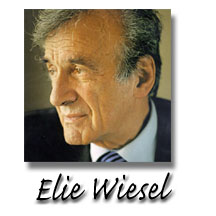
Elie Wiesel's famous book Night (1958) is a personal account of the deadly persecution of his family during the Holocaust. Wiesel grew up in the mountains of what is now Romania. In 1944, when Wiesel was 15 years old, his family was captured as part of the Nazi effort to deport and imprison Jews. His family was sent to the camp at Auschwitz, and Wiesel and his father were separated from his sisters and mother. Wiesel also spent time at the camp at Buchenwald, where his father died in 1945. After the war Wiesel studied in France and became a journalist, and Night became an international classic for its brutal depiction of the Nazi death camps. Wiesel has since authored more than three dozen books, many of them written in French and translated by his wife, Marion. In addition to novels such as A Beggar in Jerusalem (1968), The Testament (1980) and The Judges (2002), Wiesel has written books on Jewish lore and biblical characters and two volumes of memoirs. An American citizen since 1963, he has taught at Boston University and received the Nobel Peace Prize in 1986.
After the family was separated at Auschwitz, Wiesel never saw his youngest sister or mother again, but after the war he learned that his two older sisters had survived.